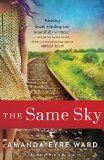Summary | Excerpt | Reviews | Beyond the Book | Readalikes | Genres & Themes | Author Bio

1
Carla
My mother left when I was five years old. I have a photo of the two of us, standing in our yard. In the picture, my mother is nineteen and bone-thin. The glass shards on the top of our fence glitter in the afternoon sun and our smiles are the same: lopsided, without fear. Her teeth are white as American sugar. I lean into my mother. My arms reach around her waist. I am wearing a cotton dress, a dress I wore every day until it split along the back seam. When the dress fell apart, my grandmother, Ana, stitched it back together with a needle and thread. Finally, my stomach pushed against the fabric uncomfortably and the garment was just too short. By that time, my mother was in Texas, and for my sixth birthday she sent three new dresses from a store called Old Navy.
When I opened that box, it seemed worth it—growing up without being able to touch my mother, to press my face against her legs as she fried tortillas on the gas stove. One dress was blue-and-white striped; on one, a cartoon girl ice-skated wearing earmuffs; the last was red. My friends with mothers—Humberto, Maria, Stefani—they stared at my outfits when I wore them to school. Maria could not take her eyes off the picture of the girl on my dress. "She's ice-skating," I said.
"Your mother?" said Humberto, scratching at his knee. Though Humberto was always covered in mud and didn't wipe his nose, I loved him and assumed we would be married in due time.
"Probably, yes, her too," I said, lifting my chin. "But I meant the girl on my dress. See? She wears earmuffs and gloves. Because it's cold. And the ice skates, obviously."
"Ice is frozen water, but a lake of it," added Stefani, whose mother had been my mother's best friend. Only my mother had been brave enough to leave, once my grandmother had saved enough for the coyote.
My mother sent money regularly and called every Wednesday at 12:45 p.m. Wednesday was her day off from working in the kitchen of a restaurant called Texas Chicken. I imagined her wearing a uniform the color of bananas. There was a movie we had watched standing outside the PriceSmart electronics store where an actress with red hair wore a banana-colored uniform and a tidy waitress hat, so when my mother described her work, I dressed her in this outfit in my mind. My mother told me her feet hurt at the end of her shift. My feet hurt, as well, when I wore the high-heeled shoes she'd sent. I needed shoes for running, I told her, and not three weeks later, a package with bright sneakers arrived.
There just wasn't much for any of us in Tegucigalpa. We lived on the outskirts of the city, about a twenty-minute walk from the dump, where the older boys and men from our village worked, gathering trash that had value. Humberto's older brother, Milton, left early in the morning. In the dark, he returned, his shoulders low with exhaustion and his hair and skin holding a rancid scent. Still—and to me, inexplicably—he had girlfriends. Though I had imagined what it would be like to kiss almost every boy in our village, I never closed my eyes and pictured Milton's lips approaching—it seemed impossible to want to be close to someone who smelled so bad. He was handsome, however, and supported his family, so there was that.
My grandmother took in laundry, and we always had enough food, or most of the time. Mainly beans. I had twin brothers who were babies when our mother left and were starting to walk around uneasily when I turned six. They had a different father than I did, and none of our fathers remained in our village. Who knew if they were alive or dead and anyway, who cared.
This was how it was: most days our teacher came to school and some days he did not. When he had not come for three days, Humberto and I decided to go and find him at his house. We did not have bus fare and so we walked. We passed the city dump and watched the birds and the men and the boys. We split an orange Humberto had stolen from the market. We plodded through the hot afternoon, and around dinnertime (if you had any dinner) we reached our teacher's address.
Excerpted from The Same Sky by Amanda Eyre Ward. Copyright © 2015 by Amanda Eyre Ward. Excerpted by permission of Ballantine Books, a division of Random House LLC. All rights reserved. No part of this excerpt may be reproduced or reprinted without permission in writing from the publisher.
Your guide toexceptional books
BookBrowse seeks out and recommends the best in contemporary fiction and nonfiction—books that not only engage and entertain but also deepen our understanding of ourselves and the world around us.